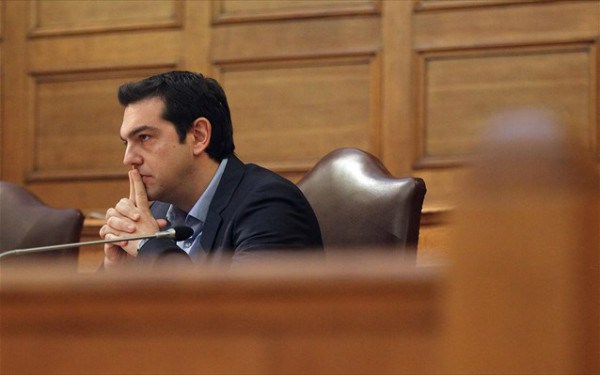BY LUKE HURST, Newsweek
Greece sought advice on economic reforms from the Organisation for Economic Co-operation and Development (OECD) today, signing an agreement that will see the group oversee the implementation of commitments promised to the country’s creditors.
In return for emergency funding, promises have been made to reform the state sector, root out corruption, fight tax evasion and make the Greek economy more competitive. Talks between a delegation of Greek officials and the country’s creditors began yesterday in Brussels, to start work on the technical details of the reforms.
At a press conference following the signing of the deal, the Greek prime minister Alexis Tsipras said the reforms discussed with the OECD were not imposed on Greece but are reforms his government wants to introduce.
Try Newsweek: 12 week subscription offer just €12 / £12
“On the side of the troika [the EU, ECB and IMF] what we saw was something like blackmail,” Tsipras said. “‘If you don’t cut pensions, if you don’t fire people, we will not give you this bit of funding.’”
“So the main difference between the previous programme based on the internal devaluation is that our reforms are focused on social justice. We’ve had enough of austerity. Enough. We need to bring back social justice and growth.”
“Our partners need to understand they need to help and assist us, and leave the past as a bad memory. We need to construct trust and confidence bridges,” he added.
The rhetoric between Greece and other Eurozone members – Germany in particular – has been ratcheted up in recent days. Hackles were raised when the German finance minister Wolfgang Schäuble was accused of talking to his Greek counterpart Yanis Varoufakis in a “condescending, pejorative manner” by a Greek diplomat speaking to Reuters. Greek media originally quoted Schäuble as calling Varoufakis “foolishly naive”, but this was later dismissed as a mistranslation. An official complaint was reportedly made with the German Foreign Ministry in response. Schäuble described the complaint as “nonsense”.
The Greek justice minister threatened this week to confiscate German-owned property in the country, following accusations that Germany owed €341 billion in compensation for Nazi war crimes in the second world war.
Bloomberg reports that the ECB agreed today to raise the ceiling on the amount of emergency liquidity assistance Greek banks can get from their central bank to €600 million. Anonymous sources say this was the amount requested by the Greece’s central bank, and the level will be reviewed again on March 18th. An economist described this as a “drip feed” of liquidity.
According to Dimitrios Katsakis, a politics lecturer at the University of Athens, the real test will come when the reforms are actually implemented and infighting within the Syriza ranks becomes more serious due to the far-left elements of the party.
“They were voted in to say no. No to the same old same old. Because the people have been desperate, they have felt humiliated and impoverished,” he says.
“We have to remember the economic and social consequences of the crisis in Greece are comparable to what happened in the great depression in the United States.”
“After the war of words, now things will have to be implemented. That’s going to be the crash test for them, and the real test is internally because of the extreme left-wing factions of the party”
“The leaders really belong more to middle-of-the-road and realist type of politics, and they have to try to keep a balance between the reality facing them and the left-wing of the party which still makes proclamations about abandoning all privatisations and things like that.”
But Greek journalist Yiannis Baboulis says that the media has a tendency to mistake internal debate for splits within Syriza.
“First, it’s an ideological bias, that this is a left-wing government and therefore it has to be a complete shambles. And second, because they think people inside Syriza are voicing opinions, they think that somehow Syriza is falling apart. But thats the way Syriza works in general. They’re voicing their opinions. It’s a very democratic party.”
Greece is expected to need a third bailout package when the current deal ends in June this year to stay afloat financially, and this will depend on the implementation of the reforms agreed on between Greece and its creditors.









